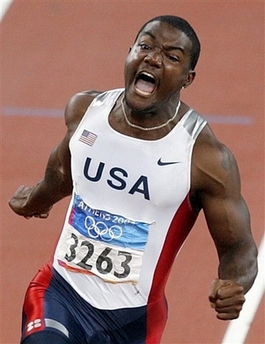Gatlin appeals doping ban to CAS
Updated: 2008-01-23 10:03
SALVO, North Carolina - Suspended Olympic 100 metres champion Justin Gatlin has appealed his four-year doping ban to the Court of Arbitration for Sport (CAS), his attorney said on Tuesday.
 Justin Gatlin, of the United States, reacts after winning the gold medal in the 100-meters at the Olympic Stadium during the 2004 Olympic Games in Athens, in this Aug. 22, 2004 file photo. Gatlin filed an appeal Monday, Jan. 21, 2008 of his four-year doping suspension in an attempt to return to the track for the Beijing Games in August. [Agencies] |
"With these filings, Mr. Gatlin is taking the next steps in recovering his right to defend his gold medal in the 100 meters, silver medal in the 400 meters relay and bronze in the 200 meters at the Beijing Olympics," Maurice Suh said in a statement.
The appeal was filed on Monday to Lausanne-based CAS.
"While there are many possible avenues that we are currently exploring, the appeal of the arbitration panel decisions are a critical component of his defense," Suh's statement added.
A three-member American Arbitration Association (AAA) panel banned Gatlin for a 2006 positive test for the banned male sex hormone testosterone and its precursors, ruling it was Gatlin's second positive.
Gatlin tested positive in 2001 for an amphetamine contained in a medication he took for 10 years for Attention Deficit Disorder. He was suspended for two years but the International Association of Athletics Federations (IAAF) later found Gatlin had not intentionally committed a doping violation and reinstated him after one year.
The IAAF also said any repetition of Gatlin's 2001 positive test would result in a life ban.
But Suh, who also represents banned cyclist Floyd Landis, said in his appeal the 2001 case should not be considered a first offense.
If CAS were to agree, Gatlin's 2006 positive test would be considered his first and he would be eligible for a two-year ban. That would allow him to return to competition in May, a month ahead of the U.S. Olympic trials.
"To use this (2001) sanction to bar him from participating in the Olympics is a prime example of unfairness to an athlete, and a grossly inappropriate balance of anti-doping efforts against the right of individuals to pursue their careers and their dreams," Suh said.
"Most troublingly, it constitutes a discrimination against a person with a diagnosed disability."
|
|
|
||
|
||
|
|
|
|